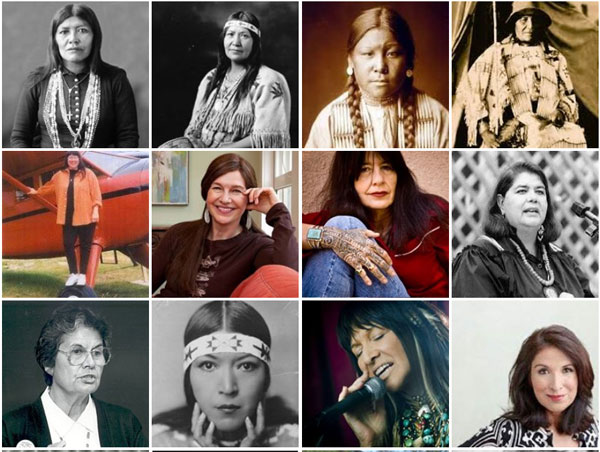Women’s History Month—March 2019 “Visionary Women: Champions of Peace & Nonviolence”

#InspiringNativeWomen
The National Indigenous Women’s Resource Center recognizes the month of March as Women’s History Month. The national theme for this year’s Women’s History Month is “Visionary Women: Champions of Peace & Nonviolence.” This year’s theme honors "women who have led efforts to end war, violence, and injustice and pioneered the use of nonviolence to change society."
This year, we are witness to countless outstanding Indigenous women who are changing our narrative. We are honored to have two Native Women, the first Native women to be elected to Congress:
- Sharice Davids (Ho-Chunk Nation): elected to United States House of Representatives (KS-3rd District). Davids is also the first openly LGBTQ woman Congresswoman from Kansas.
- Deb Haaland (Pueblo of Laguna): elected to the United States House of Representatives (NM-1st District).
We also want to recognize Peggy Flanagan (White Earth Band of Ojibwe) elected to become the Lieutenant Governor of Minnesota and Ruth Buffalo (Hidatsa/Mandan/Chiricahua Apache) elected to North Dakota State House of Representatives of District 27 in Fargo, as well as the many other Native women elected to state positions.
We have seen throngs of Native women take to the streets during national and local women’s marches, raising awareness of violence against women and Missing and Murdered Indigenous Women. American Indians and Alaska Natives (AI/AN) face disproportionate and alarming rates of domestic and sexual violence each day, but as these Native women political leaders begin work in the Nation’s Capital and in their respective states, we hope to see this picture change because these women will be in a position to bring awareness to violence against American Indian and Alaska Native women and families. They will inspire a new generation of Native women and girls to become leaders in government and change-makers in their communities and in the world in which we live.
We must also remember all the great Indigenous women who have gone before us, our mothers, grandmothers, aunties and sisters. We also want to acknowledge Tillie Black Bear, one of the founding mothers of our movement to end violence. The National Indigenous Women’s Resource Center (NIWRC) asks all advocates and activists to commit to an action to celebrate Tillie’s life and the beginning of the national battered women’s movement—by signing on (https://docs.google.com/forms/d/e/1FAIpQLSeYPT3opxOOul02exSz_rJ-eNwJl7DtBQ3KKcKXG8vyQUy2eA/viewform) and declaring October 1st as the National Tillie Black Bear Women Are Sacred Day so all can honor her legacy. “In 1978 Tillie was the first Native woman to organize a national movement and educate Congress on domestic violence and the federal trust responsibility to assist Indian tribes in protecting their women. Tillie leaves a strong legacy of tribal grassroots organizing. We are honored and challenged to continue to build our movement for safety.” Lucy Simpson, Executive Director, NIWRC. “Tillie inspired millions of other Americans from all walks of life to end domestic and sexual violence. We would like to celebrate Tillie’s life with a national day to honor her life’s work.”
Finally, we want to recognize and honor all the Indigenous women working every day in their tribal communities who are and continue to be the visionaries and the champions of peace and non-violence, who are working to create safety for Indigenous women and girls and strengthen tribal sovereignty. They are the agents of change, the voices of resistance, the healers, the givers of life, the nurtures and protectors of our planet and our most important resource, our children. We humbly ask all advocates, allies, media and community members to join in celebrating and highlighting the numerous Inspiring Native Women (https://www.facebook.com/pg/niwrc/photos/?tab=album&album_id=719299934818213) by using #WomensHistoryMonth, #NativeWomenHistory, and #InspiringNativeWomen on your social media and in your community. Let us take the time to honor those women who work tirelessly to restore safety and sovereignty to our Tribal Nations!
RESOURCES for March Women’s History Month:
- SUBMIT: A photo & short story for NIWRC’s, Inspiring Native Women, photo album on NIWRC’s Facebook. In honor of the sacredness of Native women and our ancestral grandmothers, we are sharing some of these women's stories here, in hopes of honoring their legacies, inspiring others, and celebrating their leadership. If you have a story of an inspiring historic Native woman to share, please let us know! We would love to hear from you--please contact us at predcorn@niwrc.org. https://www.facebook.com/pg/niwrc/photos/?tab=album&album_id=719299934818213
- EXPLORE: Women’s History Site from the National Archives (https://www.archives.gov/news/topics/womens-history).The National Archives celebrates Women’s History Month, recognizing the great contributions that women have made to our nation. Learn about the history of women in the United States by exploring their stories, letters, photographs, film, and other primary sources. Including a profile on Minnie Spotted Wolf. (https://prologue.blogs.archives.gov/2013/07/25/minnie-spotted-wolf-and-the-marine-corps/) one of the first Native American women to enlist in the U.S. military, joined the United States Marine Corps Women’s Reserve over 70 years ago.
- SUPPORT: The StrongHearts Native Helpline – Help us get the word out to our relatives in need 1-844-7NATIVE (762-8483) – 1-844-7NATIVE (1-844-762-8483) Monday through Friday from 9 a.m. to 5:30 p.m. CST, callers can connect at no cost one-on-one with knowledgeable StrongHearts advocates who can provide lifesaving tools and immediate support to enable survivors to find safety and live lives free of abuse.





